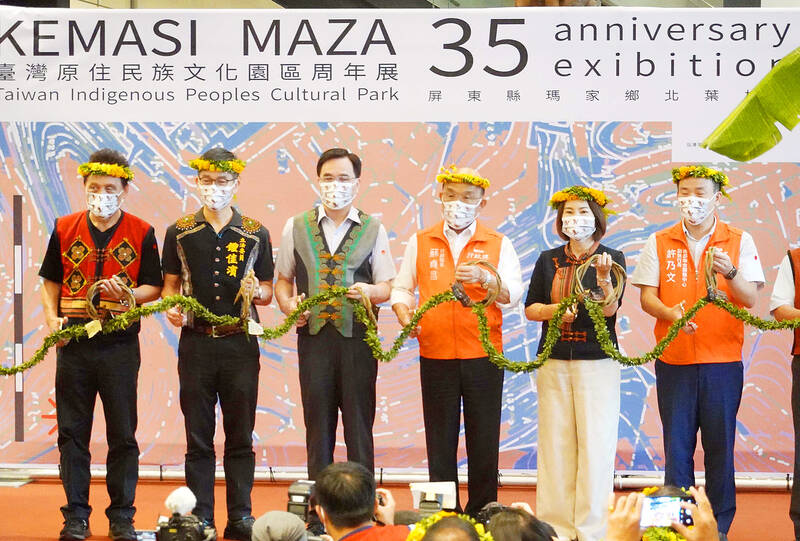Taiwan’s indigenous peoples are the true owners of the land, Premier Su Tseng-chang (蘇貞昌) said on Friday at an event marking the 35th founding anniversary of the Taiwan Indigenous Peoples Culture Park in Pingtung County’s Majia Township (瑪家).
The event was titled “Kemasi Maza,” meaning “starting here” in the Paiwan language.
Su said he attended the opening of the park as a member of the now-defunct Taiwan Provincial Consultative Council and witnessed the righting of historical wrongs that unfolded in the nation.

Photo: CNA
Then-president Lee Teng-hui (李登輝) at the opening ceremony started the process of equality for indigenous communities when he used the term “indigenous peoples” instead of “mountain compatriots” for the first time as the nation’s leader, Su said.
The Constitution has since been amended to mandate that the term “indigenous peoples” be used for official matters, and President Tsai Ing-wen (蔡英文) in 2016 issued an apology to indigenous people on behalf of Taiwan, he said.
Su said his daughter married into an Amis family from Taitung County and his granddaughter was only named in Amis.
Taiwan protects the cultural heritage of indigenous peoples to ensure they become the masters of their own land, and not to generate tourism revenue, he said.
Culture must be nurtured at the grassroots before it can be developed or internationalized, Council of Indigenous Peoples Minister Icyang Parod told the event.
Icyang said he was initially opposed to the cultural park over fears that it might serve to commercialize and stereotype indigenous cultures, adding that establishing a park for indigenous peoples without protecting their linguistic rights was particularly problematic for him at the time.
However, his fears were alleviated after the Tsai administration implemented the Indigenous Languages Development Act (原住民族語言發展法), which affirmed the right of indigenous Taiwanese to use their native languages, he said.
In January, the Executive Yuan established the national languages development forum with Su at the helm, Icyang said.
The Cabinet announced a NT$30 billion (US$976.9 million) budget covering the next five years to preserve indigenous languages and increased the council’s budget from NT$500,000 million to NT$1.3 billion, he said.
A plan to renovate the park is also being put into motion that would improve the facilities and fund the reconstruction of 25 traditional-style structures on campus, thanks to special budgets approved by the Executive Yuan in April, he added.

Chinese Nationalist Party (KMT) Chairman Eric Chu (朱立倫), spokeswoman Yang Chih-yu (楊智伃) and Legislator Hsieh Lung-chieh (謝龍介) would be summoned by police for questioning for leading an illegal assembly on Thursday evening last week, Minister of the Interior Liu Shyh-fang (劉世芳) said today. The three KMT officials led an assembly outside the Taipei City Prosecutors’ Office, a restricted area where public assembly is not allowed, protesting the questioning of several KMT staff and searches of KMT headquarters and offices in a recall petition forgery case. Chu, Yang and Hsieh are all suspected of contravening the Assembly and Parade Act (集會遊行法) by holding

PRAISE: Japanese visitor Takashi Kubota said the Taiwanese temple architecture images showcased in the AI Art Gallery were the most impressive displays he saw Taiwan does not have an official pavilion at the World Expo in Osaka, Japan, because of its diplomatic predicament, but the government-backed Tech World pavilion is drawing interest with its unique recreations of works by Taiwanese artists. The pavilion features an artificial intelligence (AI)-based art gallery showcasing works of famous Taiwanese artists from the Japanese colonial period using innovative technologies. Among its main simulated displays are Eastern gouache paintings by Chen Chin (陳進), Lin Yu-shan (林玉山) and Kuo Hsueh-hu (郭雪湖), who were the three young Taiwanese painters selected for the East Asian Painting exhibition in 1927. Gouache is a water-based

Taiwan would welcome the return of Honduras as a diplomatic ally if its next president decides to make such a move, Minister of Foreign Affairs Lin Chia-lung (林佳龍) said yesterday. “Of course, we would welcome Honduras if they want to restore diplomatic ties with Taiwan after their elections,” Lin said at a meeting of the legislature’s Foreign Affairs and National Defense Committee, when asked to comment on statements made by two of the three Honduran presidential candidates during the presidential campaign in the Central American country. Taiwan is paying close attention to the region as a whole in the wake of a

OFF-TARGET: More than 30,000 participants were expected to take part in the Games next month, but only 6,550 foreign and 19,400 Taiwanese athletes have registered Taipei city councilors yesterday blasted the organizers of next month’s World Masters Games over sudden timetable and venue changes, which they said have caused thousands of participants to back out of the international sporting event, among other organizational issues. They also cited visa delays and political interference by China as reasons many foreign athletes are requesting refunds for the event, to be held from May 17 to 30. Jointly organized by the Taipei and New Taipei City governments, the games have been rocked by numerous controversies since preparations began in 2020. Taipei City Councilor Lin Yen-feng (林延鳳) said yesterday that new measures by